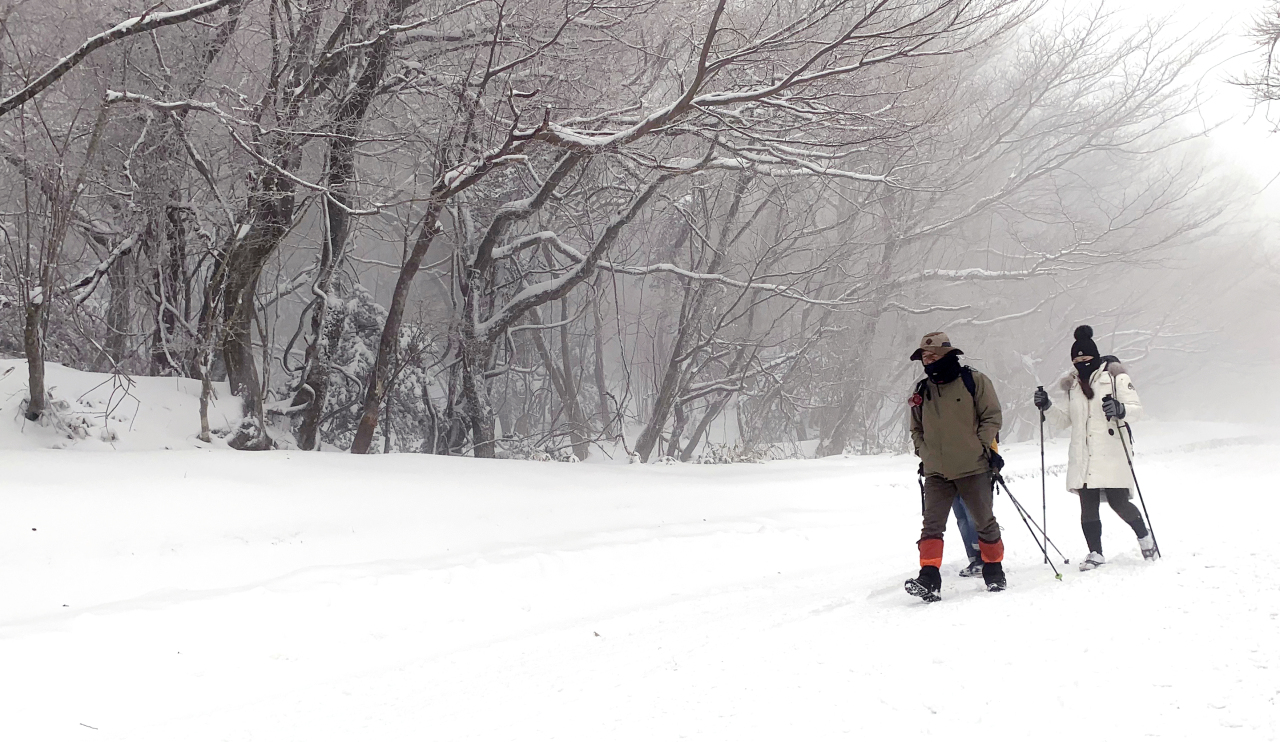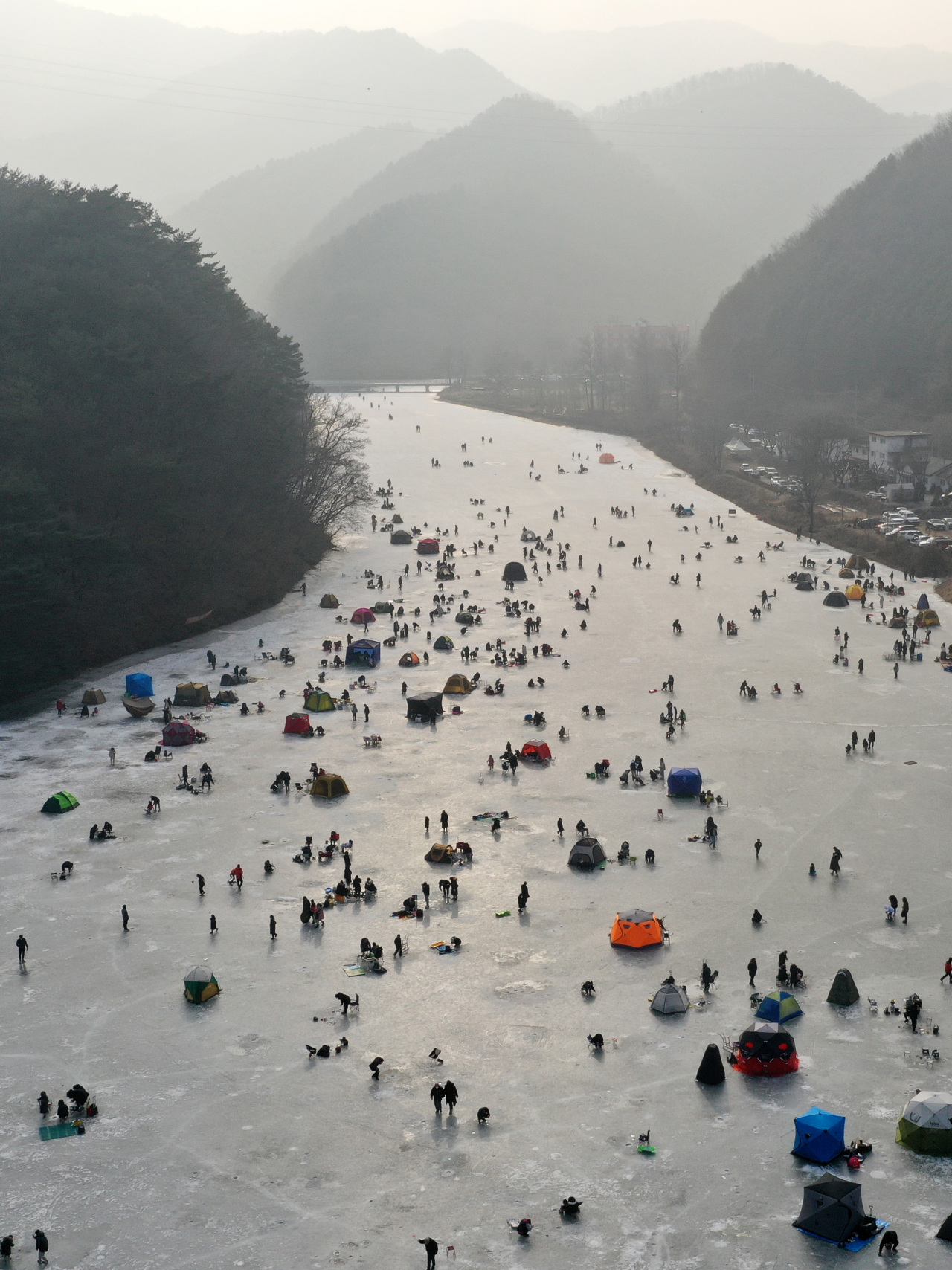[Weekender] Finding peace in winter wonderland
From hiking snow-covered mountains and horseback riding to ice fishing on frozen lakes, winter outdoor activities soothe pandemic fatigue
By Jung Min-kyungPublished : Jan. 22, 2022 - 16:01

Unlike last winter, South Korea’s high vaccination rate has given people courage to step outside and participate in outdoor activities.
Skiing and snowboarding remain popular choices, but this winter, people are seeking out less extreme activities such as hiking and fishing in search of serenity.
“Just standing on the top of Mount Halla on Jeju Island was a breath of fresh air for me,” said Lee In-ho, a 36-year-old office worker in Seoul. Lee had been delaying the planned hike since January 2020, but his long-awaited plan came to fruition last week.
“I really needed this. I was exhausted from social distancing and needed something to help my life feel normal again,” he added.
Standing at 1,947 meters, Mount Halla, South Korea’s tallest mountain, is one of the hikers’ favorite destinations here. Its summit, a crater lake called Baekrokdam, becomes covered in snow every winter, creating a unique view for visitors.
Visitors who wish to explore Baekrokdam must now make reservations on the Hallasan National Park website (visithalla.jeju.go.kr) to use the trails leading up to the summit. The Hallasan National Park Management Office has placed a cap on the number of daily visitors to 1,500 since 2020 in a bid to protect the iconic crater lake.
Many find their inner peace through hiking, but a new kind of winter activity has been catching the eyes of those seeking something fresh –- horseback riding on snow. The activity is relatively new here, with only two known Korean equestrian venues offering it at the moment.
Lee Ji-young, a 32-year-old equestrian, was one of the first to experience the activity provided by a venue in Jeju.
“They provide the services nowadays with skijoring – which is skiing behind a horse – but I didn’t like the skiing part because Jeju’s landscapes were not built for such activity,” Lee said via phone interview on Wednesday.
“The horseback riding itself, however, was a calming experience and as an equestrian, I’m willing to go back and try again.”
Skijoring and horseback riding on snow were recently featured on MBC Every 1’s reality travel show “Welcome, First Time in Korea?” and according to Lee, it is expected to gain more popularity. But she expressed some concerns as well.
“It’s difficult to find the right venue because the horses need soft snow, not hard ice, to run,” Lee explained.
For those who seek a more calming activity than hiking and horseback riding, ice fishing is a great way to appreciate the glistening beauty of frozen lakes and to embrace the frosty season.
It is no different from regular fishing- drop a fishing line and wait for a fish to bite - except that your rod hovers over a drilled hole on a frozen stream.
And there is no need to worry about venturing onto unknown lakes to scout for a prime spot. About half a dozen ice fishing venues in Gangwon and Gyeonggi Provinces that guarantee thick enough ice sheets and an ample pool of trout await visitors.
Skiing and snowboarding remain popular choices, but this winter, people are seeking out less extreme activities such as hiking and fishing in search of serenity.
“Just standing on the top of Mount Halla on Jeju Island was a breath of fresh air for me,” said Lee In-ho, a 36-year-old office worker in Seoul. Lee had been delaying the planned hike since January 2020, but his long-awaited plan came to fruition last week.
“I really needed this. I was exhausted from social distancing and needed something to help my life feel normal again,” he added.
Standing at 1,947 meters, Mount Halla, South Korea’s tallest mountain, is one of the hikers’ favorite destinations here. Its summit, a crater lake called Baekrokdam, becomes covered in snow every winter, creating a unique view for visitors.
Visitors who wish to explore Baekrokdam must now make reservations on the Hallasan National Park website (visithalla.jeju.go.kr) to use the trails leading up to the summit. The Hallasan National Park Management Office has placed a cap on the number of daily visitors to 1,500 since 2020 in a bid to protect the iconic crater lake.
Many find their inner peace through hiking, but a new kind of winter activity has been catching the eyes of those seeking something fresh –- horseback riding on snow. The activity is relatively new here, with only two known Korean equestrian venues offering it at the moment.
Lee Ji-young, a 32-year-old equestrian, was one of the first to experience the activity provided by a venue in Jeju.
“They provide the services nowadays with skijoring – which is skiing behind a horse – but I didn’t like the skiing part because Jeju’s landscapes were not built for such activity,” Lee said via phone interview on Wednesday.
“The horseback riding itself, however, was a calming experience and as an equestrian, I’m willing to go back and try again.”
Skijoring and horseback riding on snow were recently featured on MBC Every 1’s reality travel show “Welcome, First Time in Korea?” and according to Lee, it is expected to gain more popularity. But she expressed some concerns as well.
“It’s difficult to find the right venue because the horses need soft snow, not hard ice, to run,” Lee explained.
For those who seek a more calming activity than hiking and horseback riding, ice fishing is a great way to appreciate the glistening beauty of frozen lakes and to embrace the frosty season.
It is no different from regular fishing- drop a fishing line and wait for a fish to bite - except that your rod hovers over a drilled hole on a frozen stream.
And there is no need to worry about venturing onto unknown lakes to scout for a prime spot. About half a dozen ice fishing venues in Gangwon and Gyeonggi Provinces that guarantee thick enough ice sheets and an ample pool of trout await visitors.

Although strings of all-time favorite winter festivals have been canceled in the wake of the pandemic – namely the Hwacheon Sancheoneo Ice Festival – other options remain. Similar festivals include the Pocheon Baek-un valley Dongjang-gun Nadeu-ri that kicked off Jan. 7 and is set to wrap up Feb. 6; Cheongpyeong Sulbing Festival running from Dec. 24 to Feb. 25; Paju Trout Festival from Jan.8 to Feb. 13; and Ganghwa Sancheoneo Trout-Smelt Festival from Jan. 15 to March 1. Some sites are run privately, such as the Ganghwa Trout Festival from Dec. 2 to Feb. 20 organized by Yang-o fishing site and Smelt Big Festival also in Ganghwa hosted at Shin-seon fishing site from Dec. 27 to Feb. 15.
The celebratory tradition of the Korean ice fishing experience is to savor your catch immediately. Festivalgoers can take their freshly-caught fish to the cooking area where the trout is grilled on-site.
“The perk of ice fishing is that you can taste your catch right away,” says Hwang Jae-won, 25, who makes annual visits to the festivals. “I look forward to more festivals reopening next winter, but this year’s line-up will do.”
Before you head out for a day of ice fishing, be sure to bundle up with padded jacket, gloves, boots, and maybe a pair of fuzzy sleeping socks. Also take a chair to sit on, a blanket, and some hot packs to keep out the cold.
If you are tired of relaxing activities, some bold biking adventure into the snow can never hurt.
Winter cycling comes with its own set of gear, notably fat bikes- ones with supersized tires designed to better ride out snowy terrains. For those who do not wish to spend much on specialized tires, letting some air out of the wheel can do the same trick.
Of course, tires are not an absolute safety net. Riders should be wary of the challenges icy or muddy trails may present. Check the forecast, especially wind temperature. Share your route with someone else, and be flexible with plans when necessary.
Another tip is to layer your clothing so as to adjust to all possible conditions. A dry base layer, some moisture-absorbing mid-layer, and wind-blocking outer layer can help maintain good thermal heat.
South Korea’s winter can shock people with its bitter cold. Some 156 people in Korea reported cold weather related illnesses including hypothermia and frostbite between Dec. 1 to Jan. 9, according to the Ministry of the Interior and Safety. Last year, 433 people suffered from such illnesses with 7 of them dying from cold-related causes, same data showed. “It is important to pack hats, gloves and scarfs that could protect areas vulnerable to frostbites and cold weather,” Dr. Choi Jin-geol, a professor of emergency medicine at Wonju Severance Christian Hospital said.
By Jung Min-kyung (mkjung@heraldcorp.com) & Ahn Ju-hee (dianahn@heraldcorp.com)
The celebratory tradition of the Korean ice fishing experience is to savor your catch immediately. Festivalgoers can take their freshly-caught fish to the cooking area where the trout is grilled on-site.
“The perk of ice fishing is that you can taste your catch right away,” says Hwang Jae-won, 25, who makes annual visits to the festivals. “I look forward to more festivals reopening next winter, but this year’s line-up will do.”
Before you head out for a day of ice fishing, be sure to bundle up with padded jacket, gloves, boots, and maybe a pair of fuzzy sleeping socks. Also take a chair to sit on, a blanket, and some hot packs to keep out the cold.
If you are tired of relaxing activities, some bold biking adventure into the snow can never hurt.
Winter cycling comes with its own set of gear, notably fat bikes- ones with supersized tires designed to better ride out snowy terrains. For those who do not wish to spend much on specialized tires, letting some air out of the wheel can do the same trick.
Of course, tires are not an absolute safety net. Riders should be wary of the challenges icy or muddy trails may present. Check the forecast, especially wind temperature. Share your route with someone else, and be flexible with plans when necessary.
Another tip is to layer your clothing so as to adjust to all possible conditions. A dry base layer, some moisture-absorbing mid-layer, and wind-blocking outer layer can help maintain good thermal heat.
South Korea’s winter can shock people with its bitter cold. Some 156 people in Korea reported cold weather related illnesses including hypothermia and frostbite between Dec. 1 to Jan. 9, according to the Ministry of the Interior and Safety. Last year, 433 people suffered from such illnesses with 7 of them dying from cold-related causes, same data showed. “It is important to pack hats, gloves and scarfs that could protect areas vulnerable to frostbites and cold weather,” Dr. Choi Jin-geol, a professor of emergency medicine at Wonju Severance Christian Hospital said.
By Jung Min-kyung (mkjung@heraldcorp.com) & Ahn Ju-hee (dianahn@heraldcorp.com)








![[KH Explains] How should Korea adjust its trade defenses against Chinese EVs?](http://res.heraldm.com/phpwas/restmb_idxmake.php?idx=644&simg=/content/image/2024/04/15/20240415050562_0.jpg&u=20240415144419)











![[Today’s K-pop] Stray Kids to return soon: report](http://res.heraldm.com/phpwas/restmb_idxmake.php?idx=642&simg=/content/image/2024/04/16/20240416050713_0.jpg&u=)